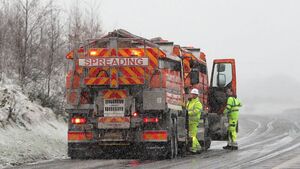Gritting of approach roads to all rural schools in County Roscommon not feasible

Gritter at work: A councillor wants Roscommon County Council to extend the winter gritting programme to include the approach roads to rural schools not currently on the programme.
A call to Roscommon County Council to extend the winter gritting programme to include the approach roads to rural schools not currently on the programme was made at a recent meeting of the council.
Cllr Sean Moylan called for gritting 500 metres in each direction from these schools.
“Although this may be expensive, it would be for a very short period when you consider Christmas holidays etc. This would greatly enhance the safety around our schools at peak times,” said the Fianna Fail councillor.
He was told in a written reply that as part of the commitment to ensuring safe road conditions during winter, Roscommon County Council conducted a thorough review of the Winter Service Plan each year, well in advance of the winter months and the plan was a strategic document designed by engineers, detailing the optimised deployment of resources to address disruptive winter weather conditions.
The meeting was told that within the plan, two levels of priority routes had been identified.
Priority 1 routes are treated during all-weather events and include national primary roads, national secondary roads, regional and local roads of national strategic importance, and those providing access to essential services.
Priority 2 routes are part of normal winter service but may experience interruptions in treatment during severe weather events.
Cllr Moylan was told that the Winter Service Plan was financed through a combination of dedicated TII national road funding and Department of Transport Discretionary Grants and represented an optimised allocation of resources and raw materials.
Expanding the existing service plan to include rural school routes would, he was told, negatively affect the council's ability to treat priority routes to the required standard.
He was told that there was insufficient capacity and insufficient funding to consider treating additional portions of the road network based on the location of rural schools.
“I’m disappointed with the answer, because anything that enhances the safety of our children travelling to schools we should be absolutely pushing to get across the line,” said Cllr Moylan.
“A lot of schools are closing, like Kilmurray in the recent past, and one of the reasons is the infrastructure around them. Anything that can help them will help the fabric of our local and rural communities,” he stressed.
He pointed out that smaller schools were struggling to get pupils, and there was a massive issue about gritting around schools. He said that the road around one local school was like “a bottle” and the school was closed more often than other schools, and the gritter passed close by on the road.
“Seventy percent of the days the gritter is needed are in December and January, and the school is closed for three weeks there, so just five weeks of gritting is needed,” said Cllr Moylan.
“Some years you’ve a lot of frost, some years not. I hope we could look at every single avenue to change what’s in front of me in black and white.”
Cllr Emer Kelly (Ind) noted that Galway County Council had put salt bins outside schools to help with road safety and she proposed that Roscommon County Council write to tits counterparts in Galway to find out how that worked out. It was seconded by Cllr Gareth Scahill (FG), and it was agreed with the Cathaoirleach, Cllr Paschal Fitzmaurice (FF), who also agreed with the Moylan motion.
“Safety is the number one issue in all of this and all the people out there in rural areas pay businesses rates and property tax, road tax, and these people feel somewhat left behind,” said Cllr Moylan.
“On a frosty morning if you are bringing your children to a small rural school and if you see a county council salt lorry, it gives a positive message, and you see that your children are as important as those in Roscommon Town, Monksland or the village of Tulsk.” He agreed with Cllr Kelly’s idea about talking to Galway County Council. “Anything is better than nothing,” he said.
Greg O’Donnell, Director of Services said that he knew the motion “came from a good place. We squeezed everything out of our resources, and the network is now prioritising the national road network and then the regional road network,” said Mr. O’Donnell. “It would be impossible to design treatment routes that focus on treating areas around schools, and you couldn’t just treat outside a school, a road is either treated or not. The system is at capacity. We’ve only so many trucks and must go out multiple times round the clock if there is snow. Unfortunately, there is not capacity to do anymore. It would be nice to do more, but unfortunately, it’s not possible.”
Mr O’Donnell said the county council did look at salt bins last year, and they had a scheme where salt could be given to communities.
“Schools are private, so they can do that themselves if they want to, and the council can’t really be providing salt to the Department of Education,” he said.
“I know it’s a well-intentioned motion, but the capacity just isn’t there.”
Cllr Moylan asked if he could amend his motion to write to the Minister for Education to seek funding for apparatus or bins for all national schools to salt the carparks by the staff. The proposal was seconded by his Fianna Fail colleague, Cllr John Keogh and agreed with by all council members.





